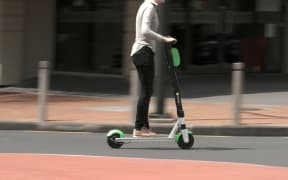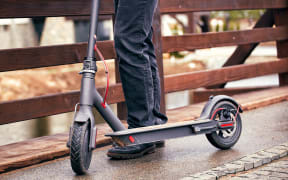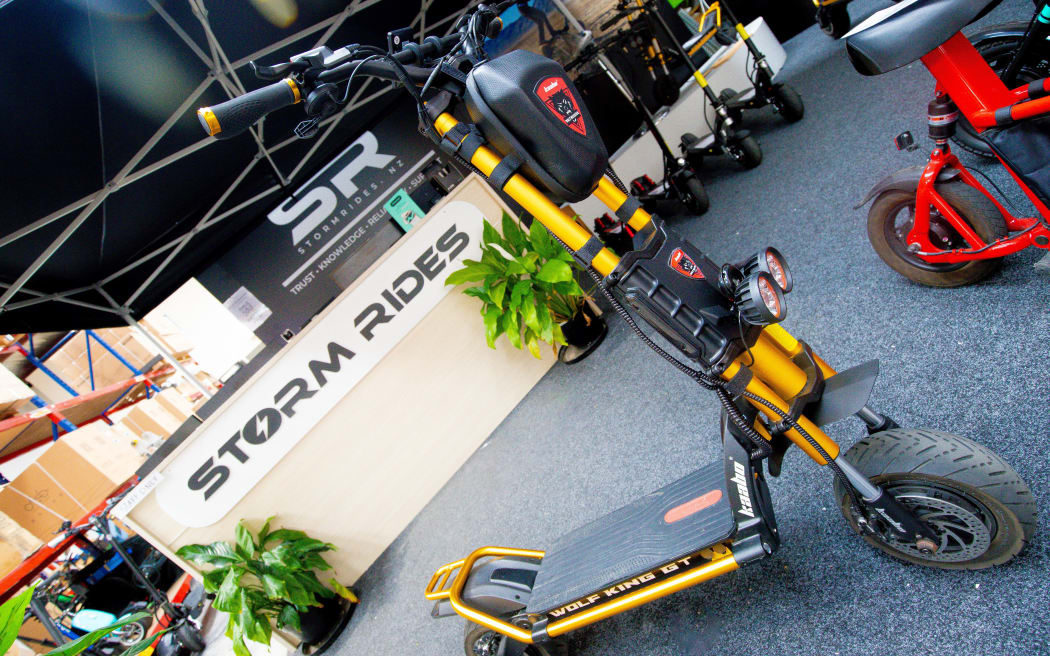
Photo: RNZ / Marika Khabazi
High-powered electric scooters are being driven illegally on roads and footpaths.
According to the Transport Agency Waka Kotahi, e-scooters cannot exceed 300 watts - that is less than a lawnmower - to qualify as "low-powered vehicles", which don't have to be registered or licensed.
At 300 watts, an e-scooter's top speed is about 35km/hr - but higher-wattage scooters, which can go nearly 100km/hr are in demand.
It is not known how many overpowered e-scooters are on the roads because they don't have to be licensed or registered.
Auckland e-scooter retailer Storm Rides managing director Andrew Altmann has ridden over-powered e-scooters to and from work for years.
"I go up the road and get my lunch on it, I take my little dog on one, it's a little sit-down scooter.
"But oooh it's over 300 watts! Illegal! Oh, I'm a criminal," Altmann laughed.
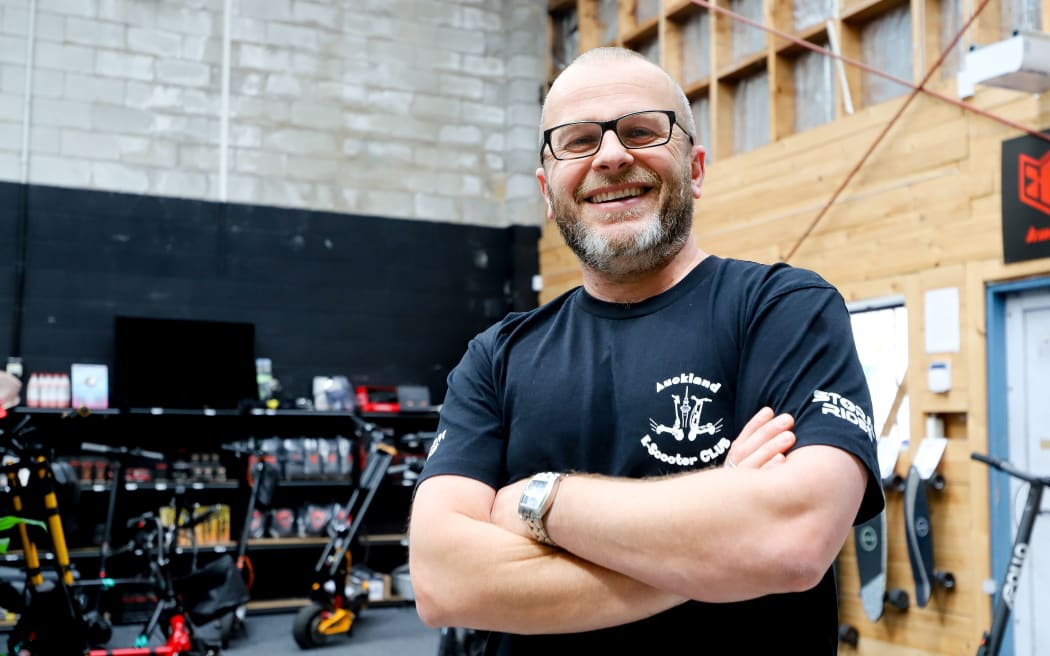
Andrew Altman wants e-scooters policed by speed, not wattage. Photo: RNZ / Marika Khabazi
Storm Rides stocks the Kaabo Wolf King GT Pro 72V, powered by two 2000-watt motors, which is 12 times more powerful than the "low-powered" class limitation and boasts a top speed of nearly 100km/hr.
Altmann agreed powerful scooters belonged on the road, not the footpath.
But in his view, the road rules should updated to make this legal, because there was currently no way to register the machines.
"It's really silly that all of a sudden it turns from the slowest silliest thing that you are not going to be able to ride up the hill, into something that is a high-powered crazy machine that goes 100km/h and is going to kill you," he said.
The authorities should be monitoring e-scooter speeds, just like cars, instead of restricting the power, which was hard to police, he said.
"I can probably think of at least half a dozen police officers who own these high-powered scooters. They ride them themselves, they love them."
Police said they were not aware of off-duty officers using the illegal overpowered e-scooters in Auckland.
A spokesperson said police did not routinely monitor vehicle wattage and were unable to say whether anyone had been ticketed for breaches.
Petone resident Chris Totton commutes from the Hutt Valley into the capital on his high-powered 2400-watt e-scooter with a top speed of 65km/h.
"It's cheaper, gets me around quite well. I can travel the same speed as vehicles on the road, so I am saving on petrol, saving pretty much on time," he said.
However, e-scooter rules were in a grey area, which created some safety risks, and the road code should be updated, Totton said.
He recently had a close shave himself.
"Came around the corner the car decided to move left into my lane and very much cut me off, to the point where I had to break hard enough that the back wheel came off the ground," he said.
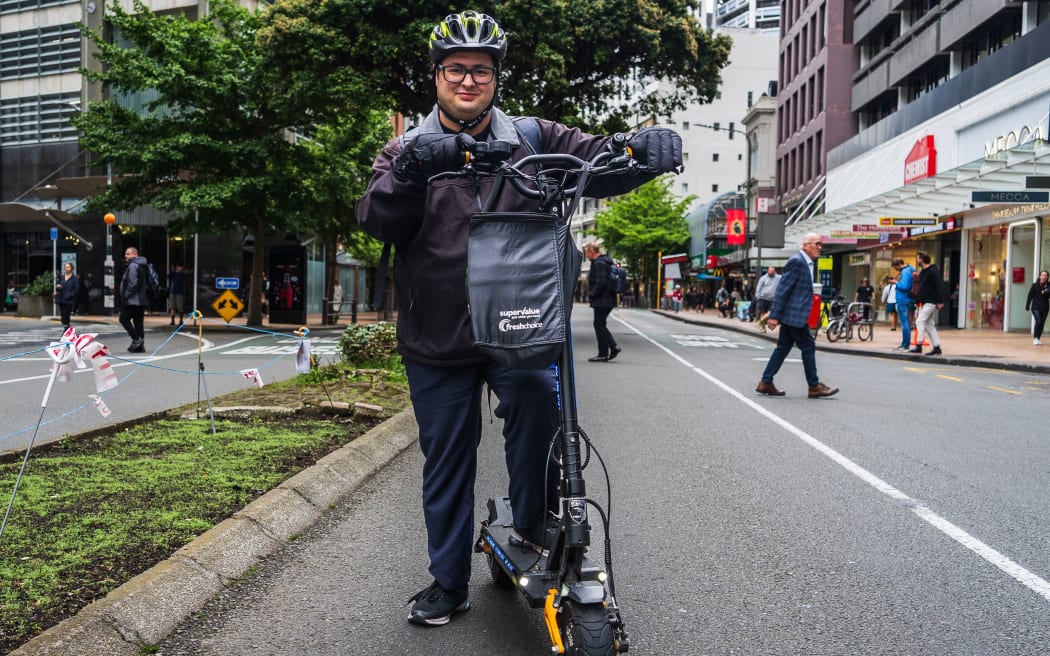
Chris Totton commutes through Lambton Quay on his 2x1200W dual motor e-scooter. Photo: Kate Judson
NZTA alerted but 'nothing has been done'
Living Streets Aotearoa pedestrian safety campaigner Chris Teo-Sherrell said high-powered e-scooters were a menace on roads and footpaths.
He had seen one recently on the road.
"I was going close to 50, it must have been doing 60-70. I have heard plenty of other stories like that too of people encountering that."
The government and Transport Agency needed to take action, he said.
"We have alerted NZTA and the government to this and nothing has been done about it, they have just basically ignored it," he said.
The problem was set to get worse, with more high-powered e-scooters being developed, he warned.
In response to questions from RNZ, the Transport Agency said it was not illegal to import high-powered e-scooters into the country - but they could not be legally used on the road without registration or a driver's licence.
Its website defines e-scooters above 300W as motor vehicles.
However, they could not be operated on the road as they had "difficulty meeting the safety standards".
The Waka Kotahi 2023 e-scooter safety review included the European Transport Council safety recommendations to "set a maximum 20km/h speed for private e-scooters at the factory."
Since 2018, Waka Kotahi has twice-extended a five-year exemption for e-scooters to not be classed as motor vehicles, up for review in 2028.
The low-powered classification excludes e-scooters from entry certification, registration, warrant of fitness, or driver licensing requirements.
More than $30 million was claimed through ACC for e-scooter-related injuries from October 2018 to 2022.
